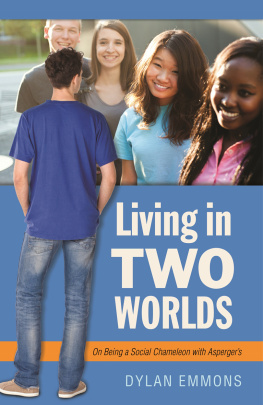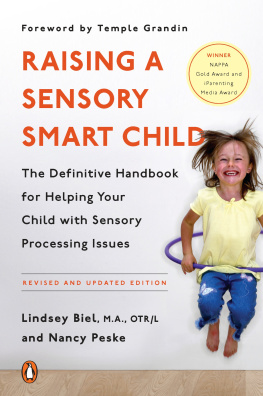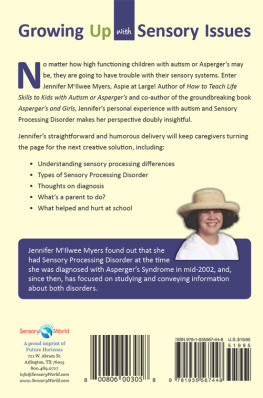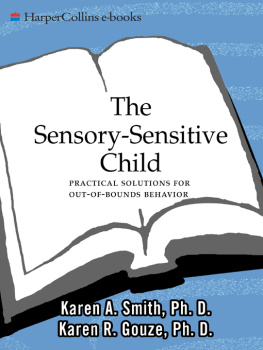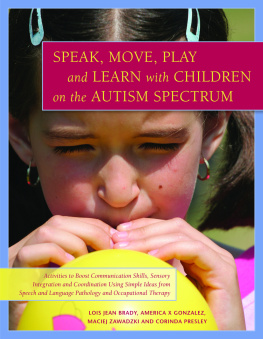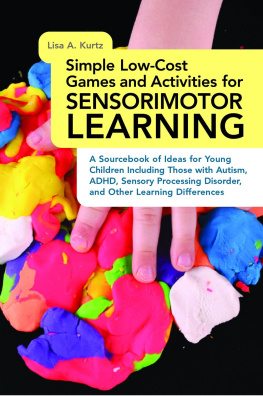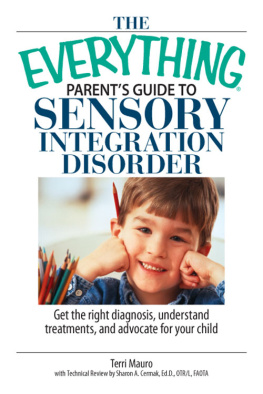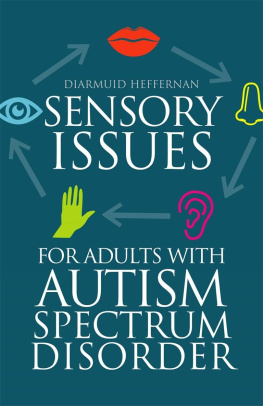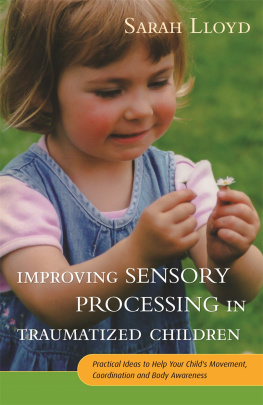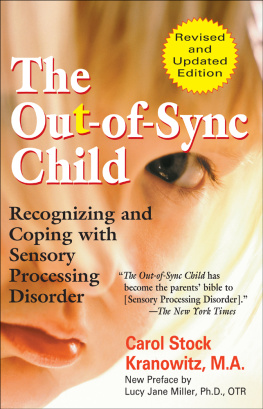
Living in
TWO
WORLDS
of related interest
Understanding Sensory Dysfunction
Learning, Development and Sensory Dysfunction in Autism Spectrum Disorders, ADHD, Learning Disabilities and Bipolar Disorder
Polly Godwin Emmons and Liz McKendry Anderson
ISBN 978 1 84310 806 1
eISBN 978 1 84642 150 1
Ketchup is My Favorite Vegetable
A Family Grows Up with Autism
Liane Kupferberg Carter
ISBN 978 1 84905 715 8
eISBN 978 1 78450 209 6
What Color is Monday?
How Autism Changed One Family for the Better
Carrie Cariello
ISBN 978 1 84905 727 1
eISBN 978 1 78450 094 8
The Autism Discussion Page on Anxiety, Behavior, School, and Parenting Strategies
A Toolbox for Helping Children with Autism Feel Safe, Accepted, and Competent
Bill Nason
ISBN 978 1 84905 995 4
eISBN 978 0 85700 943 2
Pretending to be Normal
Living with Aspergers Syndrome (Autism Spectrum Disorder)
Expanded Edition
Liane Holliday Willey
ISBN 978 1 84905 755 4
eISBN 978 0 85700 987 6
Living in
TWO
WORLDS
On Being a Social Chameleon with Aspergers
DYLAN EMMONS

Jessica Kingsley Publishers
London and Philadelphia
First published in 2016
by Jessica Kingsley Publishers
73 Collier Street
London N1 9BE, UK
and
400 Market Street, Suite 400
Philadelphia, PA 19106, USA
www.jkp.com
Copyright Dylan Emmons 2016
Front cover image source: Thinkstock and Shutterstock. The cover image is for illustrative purposes only, and any person featuring is a model.
All rights reserved. No part of this publication may be reproduced in any material form (including photocopying or storing it in any medium by electronic means and whether or not transiently or incidentally to some other use of this publication) without the written permission of the copyright owner except in accordance with the provisions of the Copyright, Designs and Patents Act 1988 or under the terms of a licence issued by the Copyright Licensing Agency Ltd, Saffron House, 610 Kirby Street, London EC1N 8TS. Applications for the copyright owners written permission to reproduce any part of this publication should be addressed to the publisher.
Warning: The doing of an unauthorised act in relation to a copyright work may result in both a civil claim for damages and criminal prosecution.
Library of Congress Cataloging in Publication Data
Names: Emmons, Dylan, author.
Title: Living in two worlds : on being a social chameleon with Aspergers /
Dylan Emmons.
Description: London ; Philadelphia : Jessica Kingsley Publishers, 2016. |
Includes bibliographical references.
Identifiers: LCCN 2015041430 (print) | LCCN 2015046577 (ebook) | ISBN
9781785927065 (alk. paper) | ISBN 9781784502638 ()
Subjects: LCSH: Emmons, Dylan--Health. | Aspergers
syndrome--Patients--Biography. | Aspergers syndrome--Social aspects.
Classification: LCC RC553.A88 E46 2016 (print) | LCC RC553.A88 (ebook) | DDC
616.85/8832--dc23
LC record available at http://lccn.loc.gov/2015041430
British Library Cataloguing in Publication Data
A CIP catalogue record for this book is available from the British Library
ISBN 978 1 78592 706 5
eISBN 978 1 78450 263 8
Dedicated to everyone living on the spectrum, with sincerest gratitude to those who love, teach, or care for someone with autism.
ACKNOWLEDGEMENTS
First and foremost, I am in debt to my best and untiring supporters: my sister, Laura; my mother, Polly; my father, Dale; and my grandmother, Frances whose belief in my writing was absolute.
I give heartfelt thanks to all of the professors at Sarah Lawrence College and Ithaca College who have helped me to develop my writing, especially Jo Ann Beard, Vijay Seshadri, Tom Kerr, Fred Wilcox, Nick Kowalczyk, Catherine Taylor, and Diane McPherson.
This work was made possible by my fellow writers, who have been my first readers and who have not only provided expert feedback on included materials, but have intimidated and inspired me with the quality of their work.
I am grateful to the teachers, aides, paraprofessionals, therapists, and bus drivers who have worked with my peers and me over the years and who are working now to enrich the lives of the students who most need it.
Special thanks to all of my friends for your continued love and encouragement, especially Jordan W.
With deepest gratitude to the memory of those who through their support and guidance at key moments in my life made this book possible, but who are no longer with us, namely Eileen ONeil, and Dr. David Bosnick.
CONTENTS
PREFACE
A friend of mine, someone Ive only become close with over the past couple of years, recently told me: I dont think you have Aspergers; I think its all in your head. Immediately, memories raced up to meet this statement, to disprove it: memories of conversations Ive tried to have, of the countless times Ive come to my senses in the middle of a conversation only to realize I was interrupting, or standing too close, or rattling on in detail about something only I am interested in. They are memories of losing myself in the world of language, of words and stories coming to me by the page, of picking up on subtle vocal inflections, of remembering thousands of useless factoids but forgetting my jacket; theyre memories of meltdowns, anxieties, and rages brought on by bee stings, forgotten homework, and other minor, malicious changes in routine; theyre memories of standing out, of being bullied and not knowing it, and of finding confidence and comradery in spite of or because of it all.
But memories arent words, and in the moment, I had no means of translating such experiences into a coherent response no adequate way to, in one or two sentences, encapsulate for my friend an adolescence full of its own idiosyncratic challenges. I could only smile and shrug. I must admit I have some mixed feelings about anyone doubting my diagnosis, especially as someone who has spent the greater part of his formative years trying to pass for normal. And by normal I dont mean a fantastic, homogeneous, or utopian normaljust the license that appears to accompany a persons association with the word and that would seemingly allow me to functionally pass through the world without immediately and involuntarily highlighting my differences or eccentricities. Because most people if they met me today wouldnt know I have Aspergers Syndrome unless I told them, the idea that I might be mistaken or even lying about having an autism spectrum disorder is a compliment and an accusation rolled into one.
Aspergers is a liminal disorderits a disorder of thin veils and blurry borders, of seeing people and their intentions as if through an opaque curtain. Its a disorder characterized by the accomplishments and setbacks of life on the edge of normal. Normalcy is never fully within reach, because like enlightenment or the perfect relationship, its very existence is dubious. For me and for many on the autism spectrum, some sense of normalcy has been worth chasing. And its in the chase that one begins, however slowly, to incorporate some of its characteristics.
At this point, I suppose Ive assumed enough of these characteristics so that some facts of my life do seem to stand in contrast with the picture many have of someone classified as disabled. Now an adjunct professor in my mid-twenties, if you happened across me working at the tutoring center, writing in a caf, going through my ritual at the gym, ordering a sandwich, or floundering through a first date, thered be almost no indication of the unique struggles Ive faced or how much work Ive put in to reach this level of functionality. Im both proud of and troubled by this.
Next page
